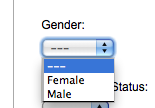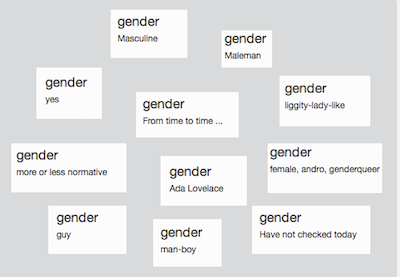Huffington Post reports that Facebook has added two new relationship-status options users can choose for their online profiles: “in a civil union” and “in a domestic
partnership.”![]()
The changes were made in consultation with Facebook’s Network of Support,
a group that includes LGBT [lesbian, gay, bisexual, transgender]
organizations such as the Gay and Lesbian Alliance Against Defamation,
the Gay, Lesbian, and Straight Education Network, and the Human Rights
Campaign.
The report quotes spokespeople for the Human Rights Campaign and Equality Matters, who herald the change as a “milestone” for the LGBT community.
Well, maybe for the LGB communities.
What the report and the spokespeople fail to mention is that Facebook continues to offer only two gender options: “male” or “female.”

Before we start congratulating Facebook for this relatively insignificant change, let’s compare the social networking site’s gender options with those of a few other popular social media sites:
FLICKR:

TWITTER:
N/A
(Twitter doesn’t ask gender)
YOUTUBE:

“No gender” is an option on YouTube.
Facebook, with its locked-in gender binary, is far behind many other social media sites.
In fact, just a few months ago Diaspora, a new open-source social networking site touted as a “Facebook killer,” made the decision to code its gender option as a text field. Diaspora users can insert anything they choose as a gender.
Sarah Mei, a developer in California who made the decision, explains:
I made this change to Diaspora so that I won’t alienate anyone I love before they finish signing up.
I made this change because gender is a beautiful and multifaceted thing that can’t be contained by a list.
I know a lot of people aren’t there with me yet. So I also made this change to give them one momentary chance to consider other possibilities.
I made it to start a conversation.
I made it because I can.
Here are some examples of how people are using Diaspora’s gender text field:

So there is little excuse for Facebook’s limited options… aside from preventing confusing demographic reports for the advertisers who pay the company for access to our “male” or “female” eyeballs.
Much worse than Facebook, though, are the spokespeople who applaud a change to the “relationship status” without a mention of how the limited gender options continue to alienate the trans members of our community.
 Why you can trust Xtra
Why you can trust Xtra


